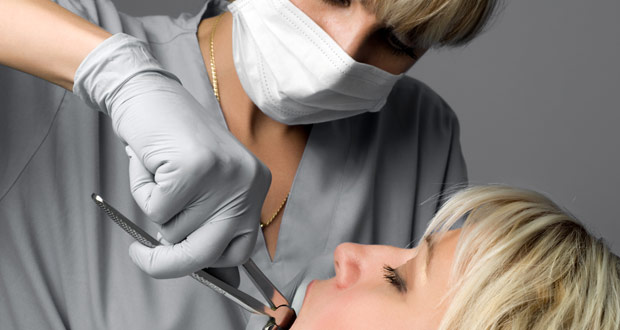Though it is best to try and keep as many of your natural teeth for the longest possible time, at times, it may be necessary to have a tooth removed. There are several factors that can contribute towards the need for tooth removal. Some of the most common reasons for tooth extraction are tooth decay, gum disease, a tooth that may get broken or damaged to the extent that it cannot be repaired and gum abscess. It is also possible that the teeth are overcrowded, making it necessary to remove a couple to straighten the others out. Often, wisdom teeth need to be extracted as well.
The tooth extraction procedure
A tooth extraction usually takes very little time and can be performed by your local dentist. In rare circumstances, a surgeon may perform the procedure at a hospital. A local anaesthetic will be injected in your mouth to numb the areas around the tooth before the procedure. The tooth socket will then be widened and the tooth will be rocked to loosen it and then pulled out. Once the tooth has been pulled out, the socket may be sealed with stitches.
A little gum bleeding can be expected from the procedure. The dentist will apply some soft padding to the area to stop the bleeding. This should not take very long. However, you may be monitored until the bleeding can be controlled. You will also be advised to rest until the effects of the local anaesthetic wears off. You may find that your coordination and reasoning are affected by the general anaesthesia, so it is best to avoid driving, drinking alcohol, operating machinery or signing any legal documents for at least a day after the procedure.
Recovery from a tooth extraction
Since you will be given some local anaesthesia for the tooth extraction procedure, it will be a few hours before any feeling returns to your mouth. It is possible that you will feel some pain after the procedure, but you can effectively get relief from the pain by taking some over the counter painkillers.
To help your recovery, there are some simple measures you can take, including avoiding rinsing your mouth for at least six hours after the tooth extraction has been performed. After this time period, wash your mouth gently with warm water and add a little table salt to the water to rinse out your mouth.
You should also try to avoid any strenuous exercise that may cause your blood pressure to rise, as well as keeping your head level to prevent the gums from bleeding. Drinking alcohol and smoking should be avoided for at least 24 hours, and you should avoid eating after a few hours of the procedure. However, when you do need to eat, you should start with soft and warm food and avoid chewing hard food as this may strain the area where the tooth has been extracted from. For the same reason, you should avoid sucking liquids from a straw.



Leave a Reply
You must be logged in to post a comment.